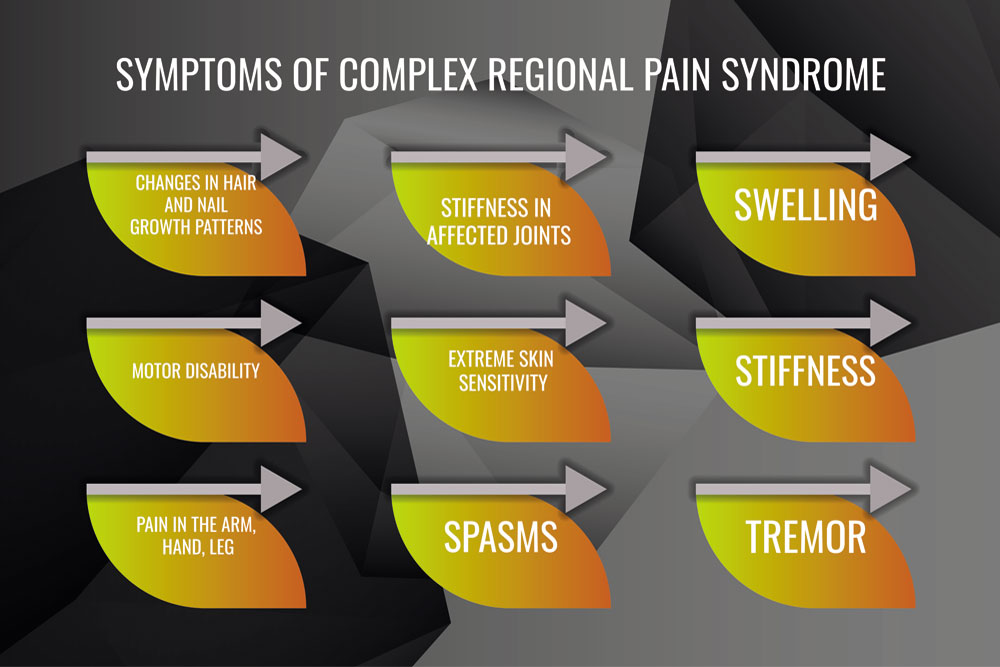Table of Contents
What Is Complex Regional Pain Syndrome and Reflex Sympathetic Dystrophy?
Complex regional pain syndrome (CRPS), formerly known as reflex sympathetic dystrophy (RSD) is a severe chronic pain syndrome that can occur after an injury, illness, or surgery. Even a minor injury can result in complex regional pain syndrome CRPS/RSD; and its persistence and manifestation can often be significantly worse than the original injury and appear out of proportion to the severity of the underlying cause. Nonetheless, CRPS/RSD can cause intense pain and sensitivity so severe that persons who suffer from the condition may not even be able to tolerate wearing light clothing. Left untreated, the condition may worsen over time.
How Is Disability Due to CRPS/RSD Established?
Because there are no specific tests that can diagnose CRPS/RSD, a diagnosis may sometimes be elusive. Typically, however, CRPS/RSD may be confirmed clinically due to observable swelling at the site of the injury, changes in skin color, texture, or temperature, abnormal hair growth, or a variety of other signs. Since CRPS/RSD is difficult to diagnose, it is not unusual for disability insurance companies to refute or deny claims involving CRPS/RSD. However, a guidance memorandum from the Social Security Administration describing how Social Security disability claims involving CRPS/RSD are to be evaluated offers instructive guidance on how to also prove disability due to CRPS/RSD to private disability insurance companies.
How Can You Fight a Benefit Denial Involving CRPS/RSD?
If you have a claim involving diagnosed CRPS/RSD that has been denied by your insurance company due to a claimed lack of objective medical evidence or other reason, you may be able to successfully challenge that denial. CRPS/RSD is a chronic illness that may result in permanent disability. Disability insurance is intended to help mitigate the loss of earnings that results from disability. Just because the insurance company has denied your claim does not mean that you cannot fight back. However, because CRPS/RSD is not easily diagnosed, winning your disability claim can be especially challenging. That is why you need an attorney experienced in and knowledgeable about CRPS/RSD claims to assist you.
Patients who suffer from complex regional pain syndrome CRPS/RSD may need to see more than one doctor before the condition is accurately diagnosed. That can often lead to insurance companies accusing claimants of “doctor shopping,” or claiming the illness is psychosomatic. However, although the cause of CRPS/RSD is unknown, the CRPS/RSD condition is a recognized physical disorder.
Even though CRPS/RSD is difficult to diagnose since it cannot be seen on an x-ray or MRI and does not have specific characteristics that appear in blood tests, a doctor experienced in treating CRPS such as a neurologist, rheumatologist, or pain specialist should be consulted. Convincing a disability insurance company that someone is disabled will also likely require legal assistance from an attorney experienced in handling CRPS/RSD claims who can assist in gathering critical evidence needed to prove disability. Such evidence includes assistance in obtaining:
- Medical opinions that document observable clinical manifestations of CRPS/RSD.
- Medical opinions that correlate symptoms to functional limitations such as the inability to concentrate and maintain attention due to pain or to perform certain activities of daily living as compared to functional status prior to the onset of disability.
- Observations from other medical professionals such as nurses, physical therapists, or occupational therapists, and psychotherapists who are treating the psychological effects of chronic pain.
- Observations made by lay observers such as family members, close friends, or co-workers.
- Contemporaneous diaries or logs kept by the claimant which document pain and other symptoms over time.
Who Can You Turn to For Assistance in Fighting a Disability Benefit Denial Involving CRPS/RSD?
An attorney experienced in handling CRPS/RSD claims can challenge an unfair denial or litigate against the insurance company on your behalf and fight for a fair outcome.







